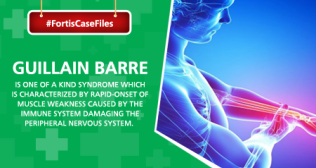
Burning Sensation in Feet
Burning Sensation in Feet - Causes, Diagnosis & Treatments
Burning feet is a condition where the person experiences a painful burning sensation in their feet. It can range from mild to severe and can sometimes be so painful that it affects the person's sleep. In some cases, the person may also feel a tingling or numbness along with a burning sensation. This condition is also referred to as tingling feet or paresthesia.
What are the causes of burning feet?
Many reasons can lead to burning feet, and the root cause can be unique to each individual. Let’s take a look at some of the common causes of burning feet.
1. Diabetic Neuropathy
Diabetes or elevated blood sugar also hampers the transmission of nerve signals. This results in reduced sensation in various parts of the body, including the feet.
2. Overuse of alcohol
Excessive alcohol consumption can result in alcoholic neuropathy, and nerve damage, which can lead to burning sensations in the feet. The symptoms of this condition include muscle weakness and loss of function, problems with urination and bowel movements, dizziness, slurred speech, and numbness in the extremities.
3. Kidney disease
When the kidneys are impaired, waste buildup occurs in the body. This can lead to peripheral neuropathy and cause a burning feeling in the legs.
4. Small fibre sensory neuropathy
Small fibre sensory neuropathy (SFSN) is a type of nerve damage that can cause painful burning sensations in the feet. It is also characterized by a loss of sensation in the feet and brief episodes of pain. SFSN develops from a loss of the protective covering, known as the myelin sheath, that surrounds nerve fibres.
5. Hypothyroidism
An underactive thyroid gland may cause a shift in hormone levels and result in swelling that compresses nerves. This can cause burning feet as well as other symptoms such as fatigue, weight gain, and dry skin. Hypothyroidism is more prevalent in individuals over 60 years old.
6. Chemotherapy
Chemotherapy is a treatment used to eliminate cancer cells. It can cause peripheral neuropathy, which causes numbness and tingling in the limbs. It can also result in other side effects such as fatigue, muscle aches, tremors, slowed reflexes and motor skills, difficulty with balance and coordination, muscle weakness, and pain.
7. Charcot-Marie-Tooth disorder
Charcot-Marie-Tooth (CMT) disorder is a genetic condition that affects the peripheral nerves, which are responsible for transmitting signals from the brain and spinal cord to the muscles and sensory organs in the arms, legs, hands, and feet. This condition causes progressive weakness and wasting of the muscles, especially in the feet and lower legs, leading to issues with balance, coordination, and mobility.
8. Athlete’s foot
An athlete's foot, also known as tinea pedis, is a common fungal infection that affects the skin on the feet. A type of fungus that thrives in warm, moist environments, such as inside shoes and socks, causes athlete’s foot. Symptoms of athlete's foot include itching, burning, scaling, and blistering of the skin, often between the toes. This infection is contagious and can spread through direct contact with an infected person.
Diagnosis of burning sensation in legs and feet
Diagnosing burning feet often starts with a physical examination by a doctor. During the exam, they check for structural problems, skin colour, reflexes, sensation, and possible fungal infections. If the cause of the burning feet is clear, additional testing may not be needed. However, in cases where the cause is not obvious, further testing may be required to make a diagnosis. These tests may include:
1. Electromyography
Electromyography is a procedure used to test muscle function by recording the electrical activity inside muscles. A probe is either placed on the skin or a needle is inserted into the muscle to perform the test.
2. Nerve Conduction Test
Nerve Conduction Test assesses how well the nerves can transmit signals. It involves stimulation of a nerve and measuring the response that it triggers in the muscle that it controls.
3. Nerve Biopsy
In rare cases, a doctor may recommend removing a sample of nerve tissue for examination under a microscope.
If tarsal tunnel syndrome is suspected, imaging tests may also be performed. The doctor will also ask about other symptoms and medical history to determine the cause of the burning feet.
Treatment of burning feet
Treatment of burning feet caused by neuropathy primarily aims to prevent further nerve damage. In some cases, treating the underlying condition can improve the neuropathy and its symptoms.
For those with diabetic neuropathy, controlling blood sugar levels is crucial to treat burning feet. Blood sugar can be controlled through dietary changes and medications.
For other forms of neuropathy, stopping the cause of nerve damage is essential to treat burning feet. For example, quitting excessive drinking for alcoholism or taking thyroid hormone for hypothyroidism.
Treatment options vary depending on the condition, such as taking vitamin B12 for deficiencies, dialysis for chronic kidney disease, or specialized therapies for GBS and CIDP.
To manage the symptoms, treatments for burning feet may include pain management and addressing abnormal sensations caused by neuropathy.
When to consult a doctor?
Foot problems can come in different forms and have varying symptoms and degrees of severity. It is important to seek medical help if a foot issue affects your daily activities or if home remedies are not effective.
A burning sensation in the feet can indicate serious underlying conditions, such as diabetic neuropathy, and it's crucial to be vigilant if you have diabetes. Keeping a close watch on your feet can help detect early symptoms such as burning, which may indicate the onset of diabetic neuropathy.
Key Takeaways
- Burning feet can range from mild to severe and may be accompanied by tingling or numbness.
- Common causes of burning feet include diabetic neuropathy, alcohol overuse, kidney disease, small fiber sensory neuropathy, hypothyroidism, chemotherapy, Charcot-Marie-Tooth disorder, and athlete's foot.
- Diagnosing burning feet involves a physical examination, and additional tests like electromyography, nerve conduction tests, and nerve biopsy may be conducted in some cases.
- Treatment focuses on preventing further nerve damage and managing the underlying condition. Controlling blood sugar levels for diabetic neuropathy and addressing the root cause of nerve damage are important.
- Treatment options may include dietary changes, medications, quitting excessive alcohol consumption, thyroid hormone therapy, vitamin B12 supplementation, dialysis, and specialized therapies.
- Pain management and addressing abnormal sensations caused by neuropathy are essential for managing symptoms.
- Seek medical help if foot issues affect daily activities or if home remedies are ineffective. Vigilance is important for individuals with diabetes, as a burning sensation in the feet may indicate diabetic neuropathy.
Understanding the causes and Treatment of burning sensation in feet, such as burning feet syndrome caused by the deficiency of specific nutrients, can greatly benefit from expert care and guidance available at Fortis Hospitals.
Popular Searches :
Hospitals: Cancer Hospital in Delhi | Best Heart Hospital in Delhi | Hospital in Amritsar | Hospital in Ludhiana | Hospitals in Mohali | Hospital in Faridabad | Hospitals in Gurgaon | Best Hospital in Jaipur | Hospitals in Greater Noida | Hospitals in Noida | Best Kidney Hospital in Kolkata | Best Hospital in Kolkata | Hospitals in Rajajinagar Bangalore | Hospitals in Richmond Road Bangalore | Hospitals in Nagarbhavi Bangalore | Hospital in Kalyan West | Hospitals in Mulund | Best Hospital in India | Gastroenterologist in Jaipur | Cardiology Hospital in India
Doctors: Dr. Rana Patir | Dr. Rajesh Benny | Dr. Rahul Bhargava | Dr. Jayant Arora | Dr. Anoop Misra | Dr. Manu Tiwari | Dr. Praveer Agarwal | Dr. Arup Ratan Dutta | Dr. Meenakshi Ahuja | Dr. Anoop Jhurani | Dr. Shivaji Basu | Dr. Subhash Jangid | Dr. Atul Mathur | Dr. Gurinder Bedi | Dr. Monika Wadhawan | Dr. Debasis Datta | Dr. Shrinivas Narayan | Dr. Praveen Gupta | Dr. Nitin Jha | Dr. Raghu Nagaraj | Dr. Ashok Seth | Dr. Sandeep Vaishya | Dr. Atul Mishra | Dr. Z S Meharwal | Dr. Ajay Bhalla | Dr. Atul Kumar Mittal | Dr. Arvind Kumar Khurana | Dr. Narayan Hulse | Dr. Samir Parikh | Dr. Amit Javed | Dr. Narayan Banerjee | Dr. Bimlesh Dhar Pandey | Dr. Arghya Chattopadhyay | Dr. G.R. Vijay Kumar | Dr Ashok Gupta | Dr. Gourdas Choudhuri | Dr. Sushrut Singh | Dr. N.C. Krishnamani | Dr. Atampreet Singh | Dr. Vivek Jawali | Dr. Sanjeev Gulati | Dr. Amite Pankaj Aggarwal | Dr. Ajay Kaul | Dr. Sunita Varma | Dr. Manoj Kumar Goel | Dr. R Muralidharan | Dr. Sushmita Roychowdhury | Dr. T.S. MAHANT | Dr. UDIPTA RAY | Dr. Aparna Jaswal | Dr. Ravul Jindal | Dr. Savyasachi Saxena | Dr. Ajay Kumar Kriplani | Dr. Nitesh Rohatgi | Dr. Anupam Jindal |
Specialties: Heart Lung Transplant | Orthopedic | Cardiology Interventional | Obstetrics & Gynaecology | Onco Radiation | Neurosurgery |
Categories
Clear allMeet the doctor

- Internal Medicine | General Physician
-
32 Years
-
1800


















